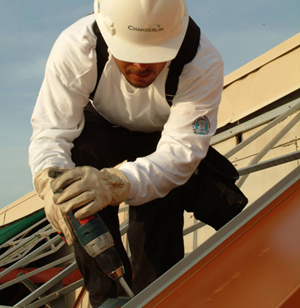 One of the challenges of establishing the credibility of the C3 formula for success has been the difficulty in collecting data that illustrates the value of craft training. When we began to collect the data that makes the case for craft training, we found an outstanding example from Chamberlin Roofing & Waterproofing, one of the C3 Accredited Employers.
One of the challenges of establishing the credibility of the C3 formula for success has been the difficulty in collecting data that illustrates the value of craft training. When we began to collect the data that makes the case for craft training, we found an outstanding example from Chamberlin Roofing & Waterproofing, one of the C3 Accredited Employers.
Art Canales, Chamberlin Vice President and a member of the C3 Craft Training Committee, is a huge advocate of craft training linked to a career path because it has proven to pay for itself many times over at Chamberlin as illustrated by the following example.
In 2007, Chamberlin experienced “call backs” to completed projects that cost $2 million that year alone. The sheer size of this expense prompted executives at Chamberlin to make the strategic decision to develop and implement a craft-training program for the Chamberlin craft workforce. In the ten years after they implemented their training program, 2008-2017, Chamberlin reduced the cost of “call backs” to $350,000, a savings of $1.65 million per year. During the same time period, Chamberlin’s business increased, and their revenue grew by 400%.
Another indicator of the value of the Chamberlin craft training program is that Chamberlin’s retention rate for its craft professionals who were trained in its 14-week apprentice program, as measured two years after program completion, is now 90%. As a result of this experience, Chamberlin has increased its investment in overall training and in its employee profit sharing program. I cannot imagine any greater testimony to the value of craft training than this.
All parties in the Houston commercial construction industry are learning about the benefits of safety and craft training. The building owner gets a safer better-built structure with lower maintenance costs and a longer building lifecycle. The construction company benefits from having skilled craft workers who are more productive and deliver higher quality work with far less rework. The skilled craft professionals themselves benefit from greater productivity and demand for their services, which naturally grows their wages through the law of supply and demand. That process of training and growing professionally enables them to earn a healthy living in a rewarding career in their chosen profession. The Houston commercial construction industry, in turn, benefits from having a sustainable craft workforce because young people will recognize the career opportunity and will be attracted to the craft trades to replace those skilled craft professionals who are retiring after a career in the industry.
If you are interested in learning more about how C3 can help your organization build a skilled and sustainable craft workforce that pays for itself many times over, as exemplified by the experience of Chamberlin Roofing & Waterproofing, please contact me at 713.999.1218 or by email at [email protected].

